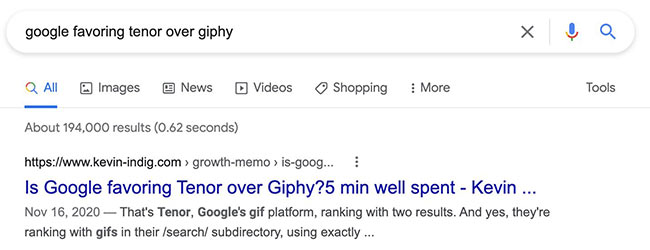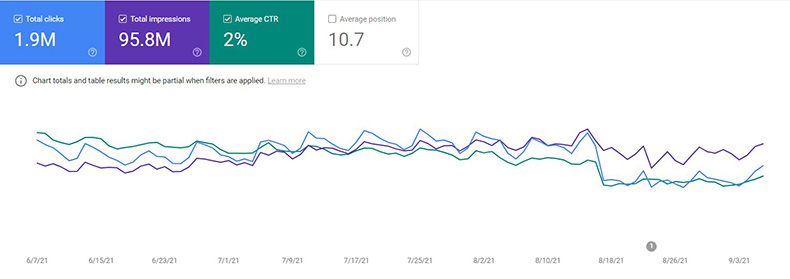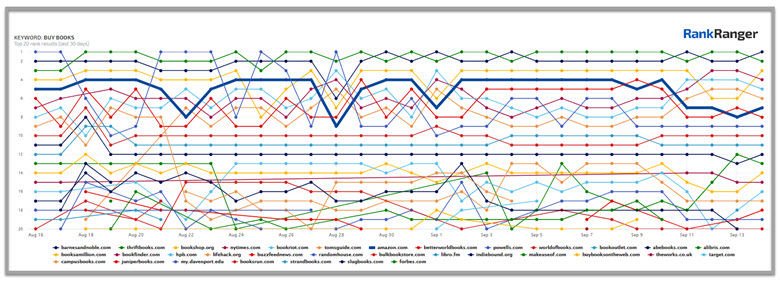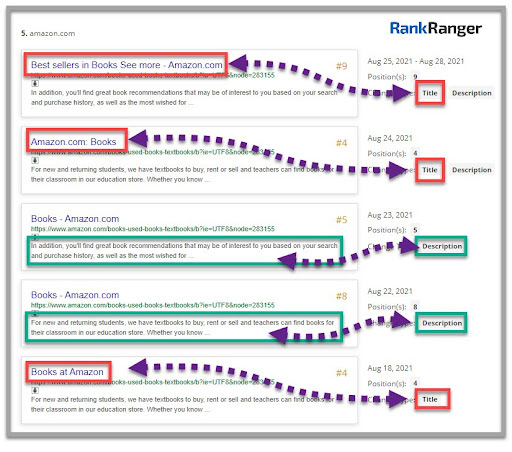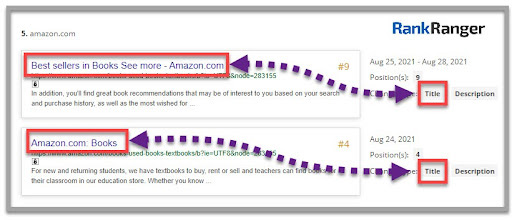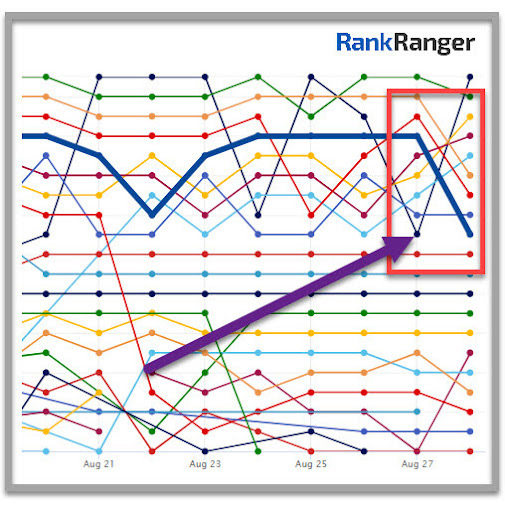Title Tag Optimization – How to Deal With Google Changing You Titles
Google’s latest page title update has caused a storm in the SEO community. I’ve seen SEOs claim that the changes to their titles have dramatically impacted their client’s click-through rates.
This means knowing what exact changes are happening to your titles in search is crucial to your success as an SEO.
In this post, I’ll explain what Google changed with this update. I’ll also show you how your keyword rank tracking software can show you:
- All the changes Google is making to your page titles and descriptions
- How to see if title changes affect your CTRs
- If there is any impact on your rankings
But, before I get into it, let’s first understand the update…
What is Google’s Page Title Update?
In mid-August 2021, Google introduced a new system of generating titles to be used in Search. Until that time, Google periodically adjusted titles in Search, generally reflecting the query the user typed into Google. In general, HTML Title Tags are the site owner’s way of telling Google how they want their title to appear in Search. However, periodically, Google will create Search titles that are not based on the title tags.
Let’s understand why Google does this.
Why Google Changes Search Titles
Although in Google’s official blog, there are a number of scenarios outlined that would cause Google to deviate from the HTML title tag, they fit into two basic categories:
- Badly written titles
- Titles that vary based on different search queries
1. Badly Written Title Tags
This basically consists of title tags that simply don’t describe what the page is about. This includes pages that:
- Don’t have HTML title tags
- Have title tags that don’t describe the page
- Have title tags that are stuffed to the hilt with keywords
When Google sees this, it simply rewrites the titles to better serve both the site owner and the Google user. This way, everyone wins.
2. Varying Search Terms
When Google ranks a piece of well-written, useful content, it’s likely it will appear on multiple SERPs on Google. This is for a number of reasons.
Although the content creator chooses a target keyword to write the content around, Google is sophisticated enough to understand that the search term itself has many variations and synonyms. The reason for this is Google now understands that keywords represent entities. In other words, they are no longer simply strings of characters. What’s more, there are many different ways to describe an entity. This means the content will generally show up for multiple variations of the target keyword.
Also, long-form content like blog posts generally covers a variety of subtopics. This often results in blog posts gaining traffic in Search from these subtopics. The best way to understand how Google understands your content and for which queries it’s showing up on is to look at Google Search Console.
In the past, when a piece of content showed up for different search terms, Google would adjust the page title to better reflect the user’s search query. This is no longer the case. (I’ll explain what’s changed next.)
The Google Page Title Update, What’s Changed?
While Google still adjusts titles and for similar reasons, the way Google makes these adjustments has changed. Instead of the titles changing to reflect the user’s query, they are now designed to more accurately reflect what the content is about.
It’s important to understand that both systems are designed to help the user. Just they serve the user in different ways.
By changing the titles to reflect the user’s search query, the old system made the content seem more attractive to the user, and this way Google was able to introduce the user to the best content for the query.
The new system is designed to serve the user in a different way. By describing the content more accurately and ignoring the search query, the new system discourages the user from clicking through to irrelevant content.
Now, this does sound like a good thing, but it hasn’t panned out well so far.
When Things go Wrong
Well, now that you’ve understood how Google changes titles and why Google makes these changes, I’m sure you’ve noticed all the chatter around this algorithm change. The reason is, as of now, Google has been making some hilarious mistakes with the new titles.
Here are some examples I saw on Jenny Halasz’s Twitter feed.
There is nothing our products want more than some honey bucket.
Here is one that was spotted by Kevin Indig:
The phrase ‘5 min well spent’ appears in the title because it is part of the H1. In this case, there is no reason for it to appear in the title as it makes for a confusing search title.
Now it’s good fun to laugh at how Google messes up titles, but Google messing this up can have some serious consequences.
For instance, here is an example of a disastrous click-through rate I saw on Lily Ray’s Twitter feed.
According to Lily, the above URL saw a 7% decline in Average CTR. This resulted in a 32% decline in organic revenue and a 34% decline in transactions. Pretty disastrous.
I think the point is clear. You must track how Google is changing your page titles.
So, here is our workflow.
Rank Tracking Software, Your Second Set of Eyes
If you are not yet acquainted I’d like to introduce you to the Rank Ranger SEO Monitor. I’ll show you how the SEO Monitor is your first line of defense when it comes to Google changing your titles.
The report is broken down into two sections.
The first section shows you your rankings in a visual graph based on historical data. So, as you can see in the screenshot below, the graph is showing the top 20 URLs and how they are ranking over a 30-day period.
In the example above, we are tracking Amazon.com for the keyword ‘buy books’. You’ll notice that the URL we are tracking, represented as a dark blue line, sometimes rises to position five while other times drops to around position ten.
If you scroll down, you’ll see a list of all the changes that were made to the page title and description in Search. This means if you or Google make any changes to your title or description, it’ll be displayed here with the date that the change occurred.
As you can see in the screenshot below, the SEO Monitor is showing you any time a change was made to your URL’s title and description over time.
Here you can easily see if Google has changed anything. You can see what title or description appeared before and what Google changed.
So now that you have the data, what do you do with it?
Do Title Changes Affect Your Rankings?
The real power of this report is in how you use the visual graph and the title changes together.
Allow me to demonstrate.
In the screenshot below you’ll see that on August 25th, Google changed the title from ‘Amazon.com Books’ to ‘Best Sellers in Books See more – Amazon.com’
Now, let’s look at the visual graph and see the rankings on those dates.
As you can see, there was a drop from position four to position nine. This means there is a direct correlation between the change of title and the drop in rankings. Now, it’s important to understand that not every drop in rankings is caused by a change in title or description.
What’s more, Google explicitly stated that the page title update does not affect rankings.
However, a change to a title might indirectly affect rankings through a drop in user signals (like CTRs). I cannot confirm this to be the case, but it’s a suggestion.
In other words, you can use this information to see if there is a correlation between rankings and title change. This information does not clearly show you what caused the ranking change.
If there is any merit to the theory that user metrics affect rankings, you can look at things like:
- CTRs in Search Console
- Average Time on Page in Google Analytics
- Bounce Rate in Google Analytics
Now, I’m not telling you that Google uses these metrics to rank pages, but I’m suggesting that if the changes to the search titles affected user metrics, these are some good places to see user metrics. Once you have this information, try to see if there are any obvious patterns to your ranking changes.
Besides ranking changes, SEOs have reported that search title changes have directly affected CTRs.
Page Title Change and CTRs
Now let’s get back to the subject of CTRs.
Once you have the exact date that Google made the title change, you can easily see if there was a CTR change by looking at your Search Console account. Just make sure to filter the results to only show the page on which the title changed.
If you find a drop in CTRs that corresponds to the title change, you’ll need to experiment with some on-page optimization to see if you can influence the way Google presents your title.
If on the other hand, you have Search Console integrated into your Rank Ranger account, you can easily check on your CTRs by going to the Google Search Console Landing Pages report. (Webmaster Tools > Google Search Console > Landing Pages)
Okay, so Google Messed up Your Title, What Should You Do About It?
Now at this point, I can’t say I have all the answers as this change is fresh, but here is one simple suggestion.
The first thing you need to do is to see what changes Google is making.
Next, understand from where Google is getting the text for the new title. This should be fairly simple to do. The first places to look are the titles in the content. More often than not, means the H1 but could be another header e.g. H2, or even from the body text.
If you can’t find the text, it might be coming from the anchor text of a link pointing to your page.
Once you’ve found the place the title is coming from, it’s time to experiment. With a few edits, you can hopefully compel Google to rewrite the title to something that works for you.
As with most things in SEO, it’s more art than science, so don’t be afraid to experiment.
Google’s Updates – A Call to Action
As with many of Google’s updates, this one has gotten off to a bad start. However, I do suspect Google will get it right as Google has been incrementally improving its systems over the years. I mean, who doesn’t remember the keyword stuffing days.
However, since Google’s updates can directly impact your business there is no question that you must go through each one with your eyes open and adapt when they affect you.
In this post, hopefully, I’ve shown you some simple and practical tips to help you through the aftermath of the update. The rest is up to you.




